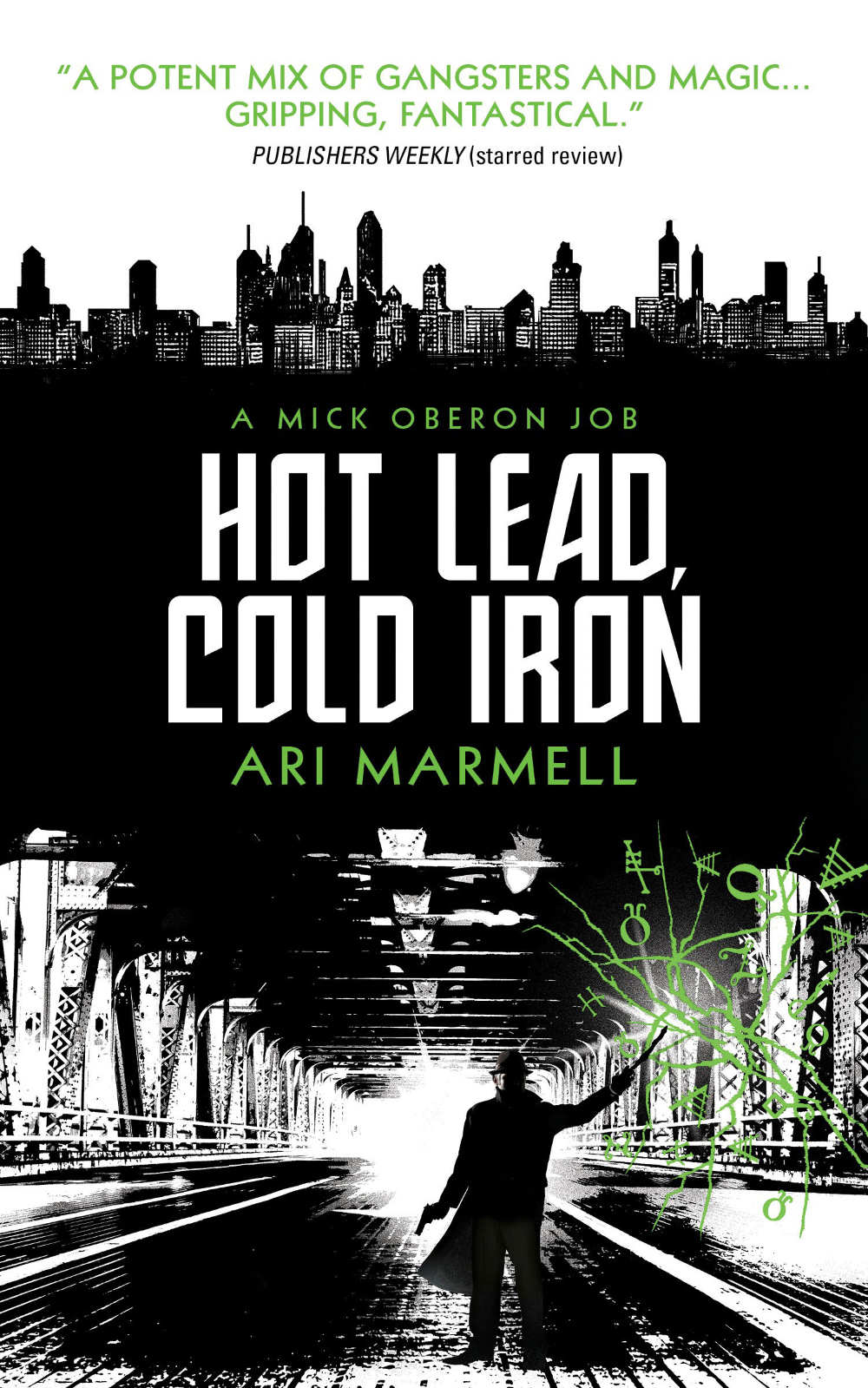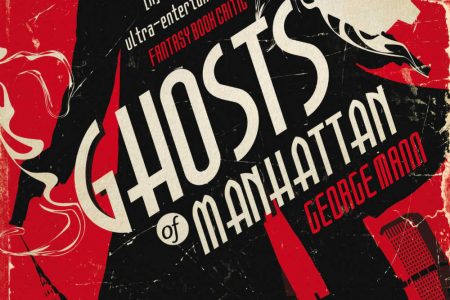Written by Ari Marmell
Published by Titan Books
This is the first story in a new series of urban fantasy about Mick Oberon; we first meet him getting beaten up by the hired muscle of a crooked committeeman of Chicago’s 34th Ward. Fortunately, it doesn’t matter too much because he heals fast and he has a wand: a Luchitaine & Goodfellow Model 1592, polished whitewood that the seller swore had a sliver of the raft that carried King Arthur to Avalon. Using magic (temporarily blinding the hired muscle, forcing luck to help him out, exerting his willpower on other people, all through the wand), he manages to accomplish his task (stealing some incriminating photos from the committeeman and serving him with a subpoena to testify) and extricate himself from any trouble.
This is all in a day’s work for Mick Oberon, private investigator in 1930s Chicago, and a former prince of the Fae (the aes sidhe, ‘the People of the Mounds’) – he is ‘among the last of the Tuatha Dé Danann, lords of the Emerald Isle, conquerors of the Firbolgs’ and has lived among mortals for many centuries (he’s seen woad-painted Celts, war-painted Indians, Vikings on longships, knights on horseback, French revolutionaries, Spanish conquistadors) when he walked away from the Seelie Court and his heritage. His hearing and sense smell is better than ours, he can detect auras, mortals cannot see the exact details of his facial features in the same way (although they can’t make out his pointed ears), he is stronger and faster and take more punishment than a human, and can understand all spoken human languages if he hears a few sentences of it. He has learned to blend in – he pretends to fidget, he remembers to blink, he speaks with the current slang no matter how ungrammatical it is – and lives in an office with no iron (the only thing that can hurt him) and no electrical or mechanical stuff: the reason why the Fae retired permanently to the Otherworld was the development of technology, which is anathema to their very being (Mick has difficulty using the elevated train, making his entire skin itch and his brain shudder, and he can barely cope with cars).
Oberon (not his real name – he took the name of the King, his third cousin on his mother’s side) works as a PI but doesn’t take money for the jobs – he doesn’t need it, because the only thing he consumes is milk (preferably warm) and he lives rent-free after he helped out his landlord; instead he takes ‘unusual’ items in lieu of payment. He also has some principles, which is why he turns down a job for The Outfit. However, when he has to find $300 to help his landlord save his building, he doesn’t have a choice – he has to seek out the man who came to his office, Archie ‘Echoes’ Caristo, a torpedo for Fino ‘The Shark’ Ottati, a capo who runs a local crew for The Outfit. He finds Echoes at the Lexington Hotel, where Al Capone used to live until he was sent to prison the previous year, but discovers that the meeting isn’t with The Shark – it’s with his wife, Bianca, who needs Oberon to find her daughter. The only problem: she’s been missing for 16 years because the girl they’ve raised is actually a changeling.
Mick needs to hunt down leads connected to Otherworld while avoiding it, so seeks out Four-Leaf Franky (who is mixed race, mostly aes sidhe, but also related to an old blood line of leprechauns [what is it with American writers and leprechauns?]), but when Franky doesn’t know anything about it – a changeling swap is pretty public in Otherworld – Mick works out that it must be a secret changeling. Therefore, Mick has to see Mrs Ottati for more information; he does so at her home, where he discovers that there are wards against Fae all over the house, created by Fino Ottati’s mother, Donna Orsola Maldera, who is also a witch (a Benandanti, a former fertility sect in 16th-century Italy that developed witchcraft as Catholics to fight evil spirits, although they were mostly eradicated by the Inquisition). It turns out that the Shark is in a feud with the Uptown Boys (bad things happen to the Shark’s enemies), but it’s not a feud that goes back 16 years, so Mick doesn’t discover any new leads, although he does meet the changeling, who is definitely Fae, who is suffering from being kept in the house with wards against Fae.
With no other recourse, Mick has to go to Elphame (the Otherworld version of Chicago – no sun or moon, impossibly beautiful, natural, more intense, where you are more ‘you’); he needs to go to the city, which is a reflection of our cities: the Fae are mimics, so the city looks like cities of the era but with Fae touches to the skyscrapers and the trains; the Fae dress in modern clothes, but with other accessories, and all armed with swords and daggers as well as magical revolvers and Tommy guns and wands. Most of the ‘civilised’ Fae are split into two factions: Seelie Court and Unseelie Court. The Seelie Court is the one associated with what we think of concerning the Fae, and titles have changed to reflect the modernisations (kings and queens are Judges and Chiefs; dukes and earls and barons are now aldermen and lawyers and captains); the Unseelie Court are the nasty side of the Fae (goblins, trolls, mari-morgan, redcaps, dullahan [headless riders on headless horses]), and take after the gangsters of our world, calling themselves the Unfit (Unseelie Outfit).
While Mick is in the city, staying at the hotel where he used to be house detective before he left for the mortal world (the Fae believe he was exiled from the Court and had his title stripped due to some sort of crime he committed; this is untrue, but he allowed the rumours to spread), Mick is attacked by a low-level torpedo. With evidence that the Seelie Court might be involved with the Ottati changeling and the attempted hit, Mick gets a meeting with Eudeagh, queen of Chicago’s Unseelie Court, Boss of Bosses of local Unseelie, which leads to him getting into a bargain with her and knowledge that will help him locate the missing daughter – who is back in ‘real’ Chicago – and try to solve everything …
The world that Marmell has created for his characters is rich and full of potential. This book has to do a lot of world-building to set things up, but he does it well, helped by the wealth of background to use. He talks about how Fae are the same, it’s just humans who differentiate: the tylwyth teg in Wales, the aes sidhe in Ireland, the elves in England, the Norse ljósálfar; they’re all the same but with different legends. This world is full of lots of different Fae: goblins, boggards, clurichans, spriggans, ghillie dhu, bean righe, gancanagh, leanan sidhe, brounies, coblynau, dvergr, pixies (and there is mention of ghosts, vampires, griffons, demons, dragons and basilisks); however, in Elphame there are more humans than Fae, people who got lost or stumbled into the wrong place or who made bad bargains. If you are human and eat the food or drink liquids or accept a gift, you never leave because you feel great and never age – the happiest slaves ever.
Mick Oberon is a great character with a classic private investigator’s sense of honour and doing the right thing, with the added advantage of being Fae; he’s got a sense of humour as well, and Marmell’s prose style is very enjoyable – the use of gangster lingo of the time never descends into parody and feels authentic at all times. The story is riveting, a page-turner that keeps you engaged as well as setting up this new urban fantasy with the scope for so many stories. Hot Lead, Cold Iron is a very good book and I can’t wait for the next story in the series.
Disclosure: this book was provided for review purposes.




